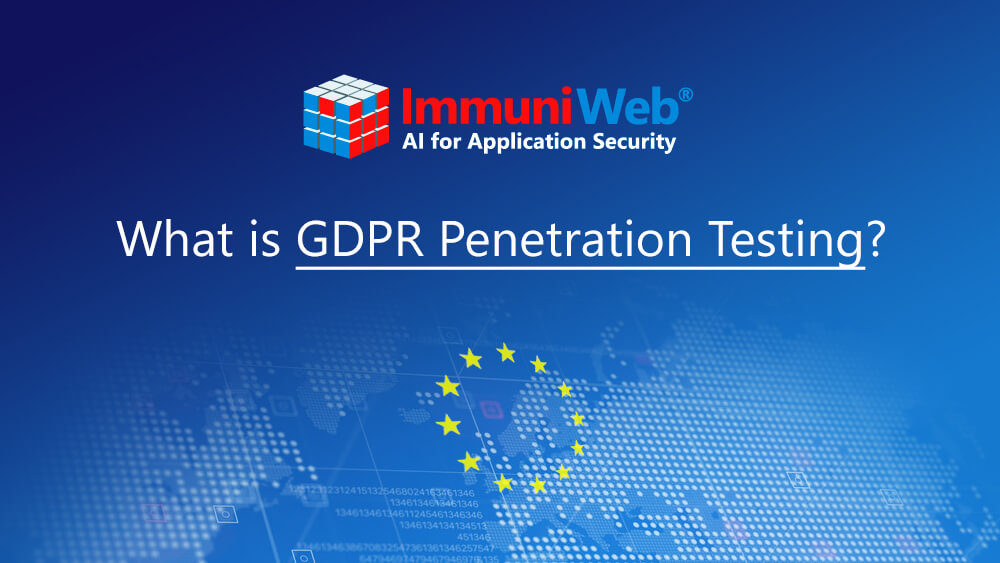What is GDPR Penetration Testing?
Penetration testing (pentesting) for the General Data Protection Regulation (GDPR) helps organizations
assess and improve their data security posture to comply with the stringent requirements of the GDPR.

GDPR penetration testing simulates real-world attacks by experienced security professionals who attempt to exploit vulnerabilities in an organization's systems and applications to gain unauthorized access to personal data.
Use ImmuniWeb® On-Demand for GDPR penetration testing of your web systems that store or process personal data as required by GDPR and EDPB guidelines.
Purpose of GDPR Penetration Testing
The primary purpose of GDPR penetration testing is to identify and remediate vulnerabilities that could be exploited by malicious actors to violate the GDPR provisions and expose sensitive personal data. This includes vulnerabilities in software, hardware, network infrastructure, and human-based processes.
Key Benefits of GDPR Penetration Testing
- Enhanced Data Protection: GDPR pen testing helps organizations identify and address data security weaknesses, minimizing the risk of data breaches and compliance violations.
- Compliance Assurance: By identifying and remediating vulnerabilities, organizations can demonstrate their commitment to GDPR compliance and reduce the likelihood of regulatory fines.
- Risk Mitigation: Pen testing helps organizations prioritize security efforts and allocate resources effectively to mitigate the most critical risks associated with data protection.
- Improved Security Posture: GDPR pen testing strengthens an organization's overall security posture and provides continuous assurance of data protection.
Types of GDPR Penetration Testing
- On-Site Testing: This involves physical access to the organization's premises and systems, allowing for a more thorough and comprehensive assessment.
- Remote Testing: This involves testing the organization's systems and applications from a remote location, typically using network-based tools and techniques.
- Hybrid Testing: This combines on-site and remote testing approaches to provide a more holistic view of the organization's security posture.
Stages of GDPR Penetration Testing
- Preparation: This stage involves gathering information about the organization's systems, applications, and data, defining the scope of the test, and establishing communication channels.
- Testing: This stage involves simulating real-world attacks to identify and exploit vulnerabilities. This may include testing web applications, internal networks, and data storage systems.
- Reporting: This stage involves documenting the findings of the pen test, including the identified vulnerabilities, their severity, and recommendations for remediation.
- Complexity of GDPR Regulations: The GDPR's broad scope and complex requirements can make it challenging to fully assess and address all compliance-related risks.
- Technical Expertise: Conducting effective GDPR pen testing requires specialized technical expertise and knowledge of the GDPR's requirements.
- Data Sensitivity: The sensitivity of personal data being protected under the GDPR adds an extra layer of complexity and caution to the pen testing process.
- Cost Considerations: GDPR pen testing can be a costly endeavor, especially for organizations with large and complex IT infrastructures.
- Learn more about GDPR Penetration Testing.
- See the benefits of our Partner Program.
- Read our Cyber Law and Cybercrime Investigation blog.
- Follow ImmuniWeb on LinkedIn, X (Twitter), and Telegram.
- Subscribe to our Newsletter.
Challenges of GDPR Penetration Testing
Importance of GDPR Penetration Testing
GDPR Penetration Testing is a critical component of an organization's data security strategy, as it helps to ensure compliance with the GDPR and safeguard the sensitive personal data of individuals. Regular pen testing helps to identify and address vulnerabilities before they can be exploited by malicious actors, minimizing the risk of data breaches and regulatory fines.
Conclusion
GDPR Penetration Testing is an essential tool for organizations that handle personal data, ensuring compliance with the GDPR and protecting sensitive information from unauthorized access and misuse. By partnering with experienced and qualified security professionals, organizations can effectively identify and remediate vulnerabilities, maintain data security, and demonstrate their commitment to data protection.

